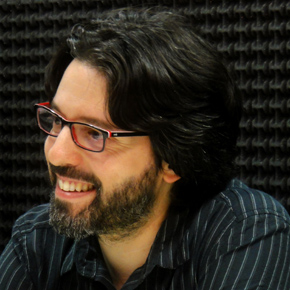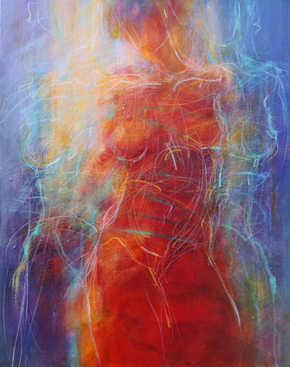On destiny
by Andrés NeumanAs prestigious as he is chaste, a certain person called P likes abstract art, chamber music and Petrarchian poetry. He has devoted two-thirds of his life to a rigorous study of the arts; the remaining third, to dreaming about them. Scrupulousness and serenity are the hallmarks of P’s domestic existence. Very occasionally, he permits himself to send a book of verse to the printers. It might even be suggested that he is not entirely dissatisfied with his latest collection. What greater excess could there be, P argues moderately, than a touch of literary vanity?
A certain person called Q, an unbridled drinker and compulsive womaniser, has for years had a vague friendship with P. Neither of them appears to be able to adequately explain their friendship to himself. Probably Q envies his friend’s wisdom and the solemn respect he receives. On the other hand, it could be suggested that P feels an obscure admiration for Q’s licentiousness, which he sees as an art or some sort of aesthetic militancy.
Out of mutual curiosity, in the course of an exceptional evening when, exceptionally, P has drunk too much wine, and Q, very unusually, seems to have sated all his appetites, they reach an accord: they will exchange places for twenty-four hours. Q informs P that the following night he has made a date with a woman friend of merry inclinations, and promises to praise his friend P to the skies. P tells Q he has promised to send a poem in honour of a certain bard who has passed away, and suggests with a chuckle that Q should be the one to pen it.
Not so much daunted as wryly amused, the two friends shake hands on their agreement.
Two days later, they meet again in a café. Q confesses his amazement at the unexpected demands of poetic creation. He describes for P his tortuous, sleepless night surrounded by the works of the deceased bard, listening to Austrian sonatas in search of inspiration. Sympathising with him, P reveals to Q his exhaustion after an unbelievable succession of late-night bars, litres of alcohol and sexual gymnastics. Haggard-looking, he admits his inability to maintain a rhythm of this sort while still keeping, as his friend does, his appearance cheerful and his lucidity intact. His friend nods, and in turn declares himself unworthy of consorting with the muses. Equally dismayed, they agree that the experiment was worthwhile, since it has confirmed them in their respective destinies. The two men finish their coffees. Shake hands once more. Say farewell again.
 That same night, P receives a call from a famous colleague, who thanks him effusively for his homage to the deceased bard, and goes so far in his praise as to dismiss all his previous production. “It was high time,” he tells P in a fit of enthusiasm, “that you gave up all that mannerism and risked saying something truly deep!” A few hours later, as he is on the verge of sleep, Q hears a whisper from the woman lying on her back in the darkness alongside him: “Don’t be offended, sweetheart, but could you give me the phone number of that friend of yours?”
That same night, P receives a call from a famous colleague, who thanks him effusively for his homage to the deceased bard, and goes so far in his praise as to dismiss all his previous production. “It was high time,” he tells P in a fit of enthusiasm, “that you gave up all that mannerism and risked saying something truly deep!” A few hours later, as he is on the verge of sleep, Q hears a whisper from the woman lying on her back in the darkness alongside him: “Don’t be offended, sweetheart, but could you give me the phone number of that friend of yours?”
From The Things We Don’t Do, translated by Nick Caistor and Lorenza Garcia.
 Andrés Neuman was born in 1977 in Argentina, and grew up and now lives in Spain. He has published numerous novels, short stories, essays and poetry collections and was selected as one of Granta’s Best of Young Spanish-Language Novelists and included on the Bogotá 39 list of outstanding new Latin American authors. His first novel to be translated into English, Traveller of the Century, was awarded the Alfaguara Prize and the National Critics Prize, and shortlisted for the 2013 Independent Foreign Fiction Prize. His second novel, Talking to Ourselves, was published in February 2014 and his first story collection in English, The Things We Don’t Do, is now published by Pushkin Press. Read more.
Andrés Neuman was born in 1977 in Argentina, and grew up and now lives in Spain. He has published numerous novels, short stories, essays and poetry collections and was selected as one of Granta’s Best of Young Spanish-Language Novelists and included on the Bogotá 39 list of outstanding new Latin American authors. His first novel to be translated into English, Traveller of the Century, was awarded the Alfaguara Prize and the National Critics Prize, and shortlisted for the 2013 Independent Foreign Fiction Prize. His second novel, Talking to Ourselves, was published in February 2014 and his first story collection in English, The Things We Don’t Do, is now published by Pushkin Press. Read more.
andresneuman.com
Nick Caistor has translated over forty books from Spanish and Portuguese, including works by José Saramago and Manuel Vázquez Montalbán. Lorenza Garcia has translated over a dozen novels and works of non-fiction from French and Spanish. They also worked together on the translations of Andrés Neuman’s two novels for Pushkin Press.
Author portrait © Magdalena Siedlecki
Also by Andrés Neuman:
A mother ago
In living memory


